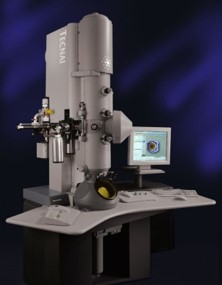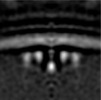+ Open data
Open data
- Basic information
Basic information
| Entry |  | |||||||||
|---|---|---|---|---|---|---|---|---|---|---|
| Title | T9SS cytoplasmic complex | |||||||||
 Map data Map data | T9SS cytoplasmic complex | |||||||||
 Sample Sample |
| |||||||||
| Biological species |  Porphyromonas gingivalis (bacteria) Porphyromonas gingivalis (bacteria) | |||||||||
| Method | subtomogram averaging / cryo EM / Resolution: 29.8 Å | |||||||||
 Authors Authors | Hu B | |||||||||
| Funding support |  United States, 2 items United States, 2 items
| |||||||||
 Citation Citation |  Journal: Proc Natl Acad Sci U S A / Year: 2022 Journal: Proc Natl Acad Sci U S A / Year: 2022Title: A unique bacterial secretion machinery with multiple secretion centers. Authors: Liqiang Song / John D Perpich / Chenggang Wu / Thierry Doan / Zuzanna Nowakowska / Jan Potempa / Peter J Christie / Eric Cascales / Richard J Lamont / Bo Hu /    Abstract: The Porphyromonas gingivalis type IX secretion system (T9SS) promotes periodontal disease by secreting gingipains and other virulence factors. By in situ cryoelectron tomography, we report that the P. ...The Porphyromonas gingivalis type IX secretion system (T9SS) promotes periodontal disease by secreting gingipains and other virulence factors. By in situ cryoelectron tomography, we report that the P. gingivalis T9SS consists of 18 PorM dimers arranged as a large, caged ring in the periplasm. Near the outer membrane, PorM dimers interact with a PorKN ring complex of ∼52 nm in diameter. PorMKN translocation complexes of a given T9SS adopt distinct conformations energized by the proton motive force, suggestive of different activation states. At the inner membrane, PorM associates with a cytoplasmic complex that exhibits 12-fold symmetry and requires both PorM and PorL for assembly. Activated motors deliver substrates across the outer membrane via one of eight Sov translocons arranged in a ring. The T9SSs are unique among known secretion systems in bacteria and eukaryotes in their assembly as supramolecular machines composed of apparently independently functioning translocation motors and export pores. | |||||||||
| History |
|
- Structure visualization
Structure visualization
| Supplemental images |
|---|
- Downloads & links
Downloads & links
-EMDB archive
| Map data |  emd_24228.map.gz emd_24228.map.gz | 635.8 KB |  EMDB map data format EMDB map data format | |
|---|---|---|---|---|
| Header (meta data) |  emd-24228-v30.xml emd-24228-v30.xml emd-24228.xml emd-24228.xml | 8.2 KB 8.2 KB | Display Display |  EMDB header EMDB header |
| Images |  emd_24228.png emd_24228.png | 64.5 KB | ||
| Archive directory |  http://ftp.pdbj.org/pub/emdb/structures/EMD-24228 http://ftp.pdbj.org/pub/emdb/structures/EMD-24228 ftp://ftp.pdbj.org/pub/emdb/structures/EMD-24228 ftp://ftp.pdbj.org/pub/emdb/structures/EMD-24228 | HTTPS FTP |
-Validation report
| Summary document |  emd_24228_validation.pdf.gz emd_24228_validation.pdf.gz | 348 KB | Display |  EMDB validaton report EMDB validaton report |
|---|---|---|---|---|
| Full document |  emd_24228_full_validation.pdf.gz emd_24228_full_validation.pdf.gz | 347.6 KB | Display | |
| Data in XML |  emd_24228_validation.xml.gz emd_24228_validation.xml.gz | 4 KB | Display | |
| Data in CIF |  emd_24228_validation.cif.gz emd_24228_validation.cif.gz | 4.5 KB | Display | |
| Arichive directory |  https://ftp.pdbj.org/pub/emdb/validation_reports/EMD-24228 https://ftp.pdbj.org/pub/emdb/validation_reports/EMD-24228 ftp://ftp.pdbj.org/pub/emdb/validation_reports/EMD-24228 ftp://ftp.pdbj.org/pub/emdb/validation_reports/EMD-24228 | HTTPS FTP |
-Related structure data
- Links
Links
| EMDB pages |  EMDB (EBI/PDBe) / EMDB (EBI/PDBe) /  EMDataResource EMDataResource |
|---|
- Map
Map
| File |  Download / File: emd_24228.map.gz / Format: CCP4 / Size: 722.7 KB / Type: IMAGE STORED AS FLOATING POINT NUMBER (4 BYTES) Download / File: emd_24228.map.gz / Format: CCP4 / Size: 722.7 KB / Type: IMAGE STORED AS FLOATING POINT NUMBER (4 BYTES) | ||||||||||||||||||||||||||||||||||||
|---|---|---|---|---|---|---|---|---|---|---|---|---|---|---|---|---|---|---|---|---|---|---|---|---|---|---|---|---|---|---|---|---|---|---|---|---|---|
| Annotation | T9SS cytoplasmic complex | ||||||||||||||||||||||||||||||||||||
| Projections & slices | Image control
Images are generated by Spider. generated in cubic-lattice coordinate | ||||||||||||||||||||||||||||||||||||
| Voxel size | X=Y=Z: 9 Å | ||||||||||||||||||||||||||||||||||||
| Density |
| ||||||||||||||||||||||||||||||||||||
| Symmetry | Space group: 1 | ||||||||||||||||||||||||||||||||||||
| Details | EMDB XML:
|
-Supplemental data
- Sample components
Sample components
-Entire : T9SS
| Entire | Name: T9SS |
|---|---|
| Components |
|
-Supramolecule #1: T9SS
| Supramolecule | Name: T9SS / type: complex / ID: 1 / Parent: 0 |
|---|---|
| Source (natural) | Organism:  Porphyromonas gingivalis (bacteria) Porphyromonas gingivalis (bacteria) |
-Experimental details
-Structure determination
| Method | cryo EM |
|---|---|
 Processing Processing | subtomogram averaging |
| Aggregation state | cell |
- Sample preparation
Sample preparation
| Buffer | pH: 7 |
|---|---|
| Vitrification | Cryogen name: ETHANE |
- Electron microscopy
Electron microscopy
| Microscope | FEI POLARA 300 |
|---|---|
| Image recording | Film or detector model: GATAN K2 SUMMIT (4k x 4k) / Detector mode: COUNTING / Average electron dose: 2.0 e/Å2 |
| Electron beam | Acceleration voltage: 300 kV / Electron source:  FIELD EMISSION GUN FIELD EMISSION GUN |
| Electron optics | Illumination mode: OTHER / Imaging mode: BRIGHT FIELD |
| Experimental equipment |  Model: Tecnai Polara / Image courtesy: FEI Company |
- Image processing
Image processing
| Final reconstruction | Applied symmetry - Point group: C12 (12 fold cyclic) / Resolution.type: BY AUTHOR / Resolution: 29.8 Å / Resolution method: FSC 0.143 CUT-OFF / Number subtomograms used: 694 |
|---|---|
| Extraction | Number tomograms: 516 / Number images used: 694 |
| Final angle assignment | Type: OTHER |
 Movie
Movie Controller
Controller






 Z (Sec.)
Z (Sec.) Y (Row.)
Y (Row.) X (Col.)
X (Col.)




















